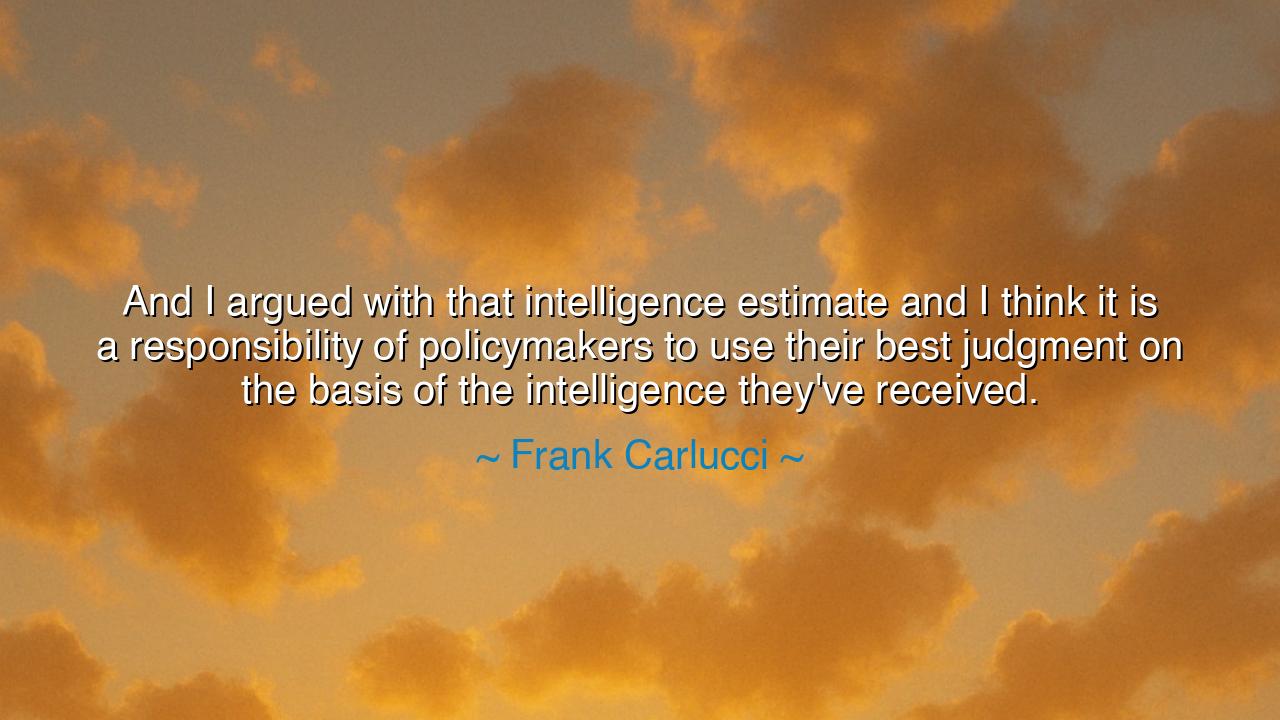
And I argued with that intelligence estimate and I think it is a
And I argued with that intelligence estimate and I think it is a responsibility of policymakers to use their best judgment on the basis of the intelligence they've received.






“And I argued with that intelligence estimate and I think it is a responsibility of policymakers to use their best judgment on the basis of the intelligence they've received.” Thus spoke Frank Carlucci, a man of the Cold War era — a soldier, diplomat, and statesman, who walked the narrow bridge between knowledge and decision, between intelligence and judgment. His words carry the solemn weight of those who have seen how truth can be both weapon and burden. For Carlucci’s insight is not only political; it is philosophical. He reminds us that wisdom is not born from knowing alone, but from the courage to question what is known, and to act rightly despite uncertainty.
In this saying, Carlucci reflects the eternal struggle between the advisors who know and the leaders who must decide. The intelligence estimate — that careful gathering of secret facts, probabilities, and possibilities — is never perfect, for it is shaped by human eyes and human error. To argue with it, as Carlucci did, is not rebellion but duty. For even the most brilliant analysis cannot relieve a leader of the burden of judgment. Knowledge is the torch; but it is judgment that decides where to carry it. Without discernment, intelligence becomes mere noise, and information — however vast — is useless without the moral and intellectual clarity to use it wisely.
This truth echoes across the centuries. Recall King Solomon, who, when offered divine wisdom, did not ask for more knowledge, but for understanding, that he might judge rightly between good and evil. Knowledge alone could not make him just; only the balance of mind and heart could. So too in Carlucci’s world, amid the labyrinth of Cold War politics, leaders faced decisions that no book or report could resolve. The responsibility of policymakers, he said, was not to obey intelligence blindly, but to interpret it — to bring to it the higher wisdom of judgment. For facts may tell what is, but wisdom alone discerns what ought to be.
Carlucci’s words were forged in a time when the fate of nations depended on unseen calculations — on satellites, spies, and whispers carried through wires. Yet he knew that intelligence, though precise, was never absolute. During those perilous years, when the United States and the Soviet Union held the world in the grip of nuclear fear, a single flawed estimate could ignite catastrophe. Thus, Carlucci’s argument was not arrogance, but vigilance. He taught that leadership demands doubt, not as weakness, but as strength — the humility to question even the experts, and to see beyond what data can declare.
We see this principle echoed in other moments of history. When Abraham Lincoln faced his cabinet during the American Civil War, his advisors often disagreed about the course of action. Intelligence told him of the enemy’s movements, of the risks and the costs. But it was Lincoln’s judgment, born of conscience and faith, that led him to sign the Emancipation Proclamation, turning the war from a struggle for union into a crusade for human freedom. His generals brought him facts; his own spirit brought him vision. And that, Carlucci would say, is the highest duty of any policymaker — to see beyond the report, to hear beneath the numbers, and to decide with the whole mind and heart united.
The wisdom of this quote also speaks to the life of the ordinary person. For we all, in our way, receive “intelligence estimates” — the advice of others, the data of experience, the signals of the world. Yet, as Carlucci warns, it is not enough to collect knowledge; one must interpret it with discernment. In every family, business, or community, decisions must be made that reason alone cannot dictate. To rely only on the counsel of others is to surrender one’s moral agency. The wise man listens deeply but decides bravely, knowing that truth must pass through the furnace of his own understanding before it can become action.
Therefore, O seeker of wisdom, let this teaching guide you: knowledge is the foundation, but judgment is the builder. Gather counsel, but do not be enslaved by it. Trust experts, but not without testing their conclusions in the crucible of reason and conscience. For even the most polished intelligence cannot absolve you of responsibility. Whether you lead nations or simply your own soul, you are the policymaker of your destiny. Use your best judgment, as Carlucci urged, and let that judgment be tempered by humility, integrity, and truth.
In the end, Frank Carlucci’s words remind us that leadership — in state or in spirit — is not the art of knowing everything, but the courage to act wisely amid uncertainty. Intelligence guides; judgment decides. And those who unite the two — who temper insight with wisdom and action with morality — become not merely policymakers, but guardians of the human future.






AAdministratorAdministrator
Welcome, honored guests. Please leave a comment, we will respond soon